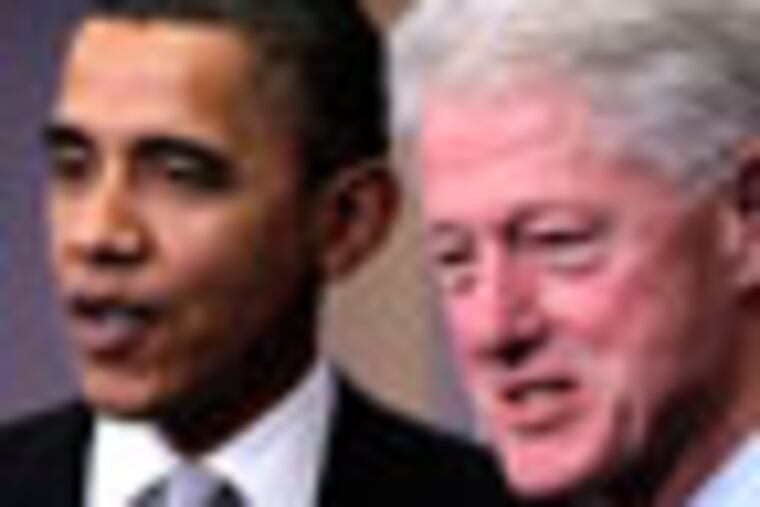The many faces of Bill Clinton
When Bill Clinton wows the Democratic convention this week, no doubt making the case for Barack Obama better than Obama himself, we'll see the former and current presidents, their arms raised in solidarity before a cheering throng.

When Bill Clinton wows the Democratic convention this week, no doubt making the case for Barack Obama better than Obama himself, we'll see the former and current presidents, their arms raised in solidarity before a cheering throng.
But there is an interesting subplot behind the feel-good "optics," to borrow the latest political term of art. The relationship between the two presidents is more complex than this week's photos will suggest, and has been characterized in recent months by some severe Clinton hardball tactics that will remind you of the many faces of Bill Clinton.
In no less than seven local races across the country, including two in our backyard, Clinton swept into Democratic primaries late in the process to deny nominations to Obama's favored candidates. Remember the barrage of commercials featuring Clinton endorsing Kathleen Kane for attorney general in her Pennsylvania primary against Patrick Murphy last spring? Kane had been a fund-raiser for Hillary Rodham Clinton in 2008. Murphy, who had been elected to Congress on an antiwar platform, was an early supporter of Obama, who had come out in favor of a timeline for withdrawal from Iraq.
When the former president inserted himself into those local primaries, it looked as if he were hell-bent on rewarding his wife's friends and settling scores. "The Clintons don't forget a thing," one Democratic political consultant told me.
In the Kane-Murphy race, as in others, the Obama team sent in adviser David Axelrod to try to counter the big dog's effect, to no avail. But Murphy, who is currently campaigning for Kane, isn't crying foul. "Politics is a contact sport, and I'm a big boy," he says. "I don't regret supporting Obama in '08."
Elsewhere, in a California congressional primary, Clinton supported Brad Sherman over Obama supporter Howard Berman. In North Jersey's Ninth Congressional District, Clinton sided with Bill Pascrell over Steve Rothman (the chair of Obama's 2008 Garden State campaign). In Pennsylvania's 12th District, Clinton was critical in Mark Critz's come-from-behind upset of Jason Altmire - who had been neutral in '08, but who reportedly annoyed the Clintons then by teasing them with an endorsement that never came.
I should note here that I'm an admirer of Bill Clinton. On balance, given our recent history, who wouldn't opt for the Clinton years of economic growth, budget surpluses, and peace? But there's something more than a tad disappointing about an ex-president with such soaring, inspirational talents being so . . . transactional. Murphy's early endorsement of Obama in 2008 wasn't born of calculation; it was done at a time when most of the country couldn't pronounce the name of the senator from Illinois.
Is it naive of me to blanch at the prospect of Clinton responding like the type of backroom pol he once tried to rid Arkansas of?
"I guess you could say it's naive, yes," says legendary political consultant Robert Shrum. "This is old-fashioned politics. He's paying people back who were helpful to Hillary, and it indicates he might think she'll run in 2016, despite her denials. What you're reacting to is the fact that we haven't had a Democratic ex-president with this kind of viability and impact since, well, ever."
I get that, but still . . . there's a part of me that often feels just a little bit disappointed by all this. As Shrum suggests, that's more my fault than Clinton's: I still want him to be more like Jed Bartlet, fictional president of The West Wing, than real-life Chicago pol Richard J. Daley - someone who tempers his political skills with a sense of wisdom, someone who, though flawed, time and again rises above smallness. And yet I know that's not to be. I'm reminded of an old anecdote Charles Barkley once told. Years ago, he played golf with Clinton, whose frat-boy demeanor prompted even Charles to want to say: "Man, you're supposed to be the president!"
In late 2007, I spent three months testing the waters for my own congressional candidacy. I was invited to a Clinton fund-raiser for Hillary, at which I excitedly hoped to pick the brain of the former president. During a photo op, after I told him I was considering running for Congress, he said, "That's nice," followed quickly by the phrase: "That's a great bag." I turned to him; he was talking to a leggy blonde next to the photographer.
"I love that bag," he said. "Come on over here for a picture with that bag."
He wouldn't stop talking about the bag, even doing that lip-bite thing when he means to convey sincerity. My big moment was over - I was literally boxed out of the picture as he went on and on about the bag. I found the experience hilarious - and useful. I wrote about it in GQ magazine and have "dined out" on the anecdote ever since.
But, really, what gnaws at me - and this is odd to say about someone who has achieved the highest office in the land - is Clinton's unfulfilled potential. He's so brilliant that he could have been someone we hold up not just as a great politician but also as a great leader, a true statesman - as admittedly corny as that sounds. We've seen that part of him in his international advocacy, and in his humanitarian work with former President George H.W. Bush. We'll see that side of him once more this week, and it will remind us again how good he was - and how much greater he could have been.